Drug Rehab and Alcohol Rehab in Luton and near Luton
Quick links for drug rehab and alcohol rehab in Luton and near Luton
- Who is Drug Rehab and Alcohol Rehab in Luton Suitable For?
- How Can I Refer Myself Into Drug Rehab and Alcohol Rehab in Luton?
- What is the Pre-Admission Assessment When Going to Drug Rehab and Alcohol Rehab in Luton?
- How Can an Intervention Help a Loved One in Need of Drug Rehab and Alcohol Rehab Treatment in Luton?
- How Do You Treat an Addiction at Drug Rehab and Alcohol Rehab in Luton?
- What is the Difference Between Residential and Outpatient Drug Rehab and Alcohol Rehab in Luton?
- Can I Recover From Addiction Without Professional Drug Rehab and Alcohol Rehab in Luton?
- What is the Cost of Drug Rehab and Alcohol Rehab in Luton?
- How Do I Choose the Right Drug Rehab & Alcohol Rehab in Luton?
- What is Relapse Prevention Planning at Drug Rehab and Alcohol Rehab in Luton?
There are drug and alcohol help options available for those people in Luton who could benefit from the assistance of a drug and alcohol rehab.
The type of option that will be best for the individual’s needs may vary as there is no one recovery path that seems to work for everyone.
One of the possible resources that people in Luton and near Luton will certainly want to consider is alcohol rehab and drug rehab. These facilities provide an environment that is highly conducive to recovery.
Some people are reluctant to choose a private drug and alcohol rehab because they worry about the expense, but this can actually be a superb investment.
It is always difficult to admit that you have a problem with drug and alcohol addiction. If you are seeking drug and alcohol rehab Luton or near Luton, Rehab Recovery can help you.
To put your recovery into context, Luton has an elevated level of opiate and crack-cocaine use in comparison with other areas in England, but lower rates of alcohol abuse.
This means that it is necessary that those who have drug and alcohol addiction issues in the Luton area seek help and assistance in the form of drug and alcohol rehab treatment.
There are an estimated 10 million people in the UK who exceed the low-risk drinking guidelines put forward by the Chief Medical Officer, [1] 1.7 million people who are high risk drinkers and 600,000 who are addicted to alcohol.
Drug and alcohol addiction is an extremely serious condition, as the following drug and alcohol crime statistics in Luton will show:
| Drug and Alcohol Crime Statistics in Luton | Value |
|---|---|
| Annual Crime Rate in Luton | 3.2 crimes per 1000 workday people |
| Crime Rate Compared to National | 117% |
| Drug and Alcohol Crime Percentage | 3.1% |
| Total Drug and Alcohol Crimes in Luton | 1.0k |
| Year-over-Year Decrease in Drug and Alcohol Crimes | 4.9% |
| Drug and Alcohol Crime Rate in Luton | 3.2 crimes per 1,000 working people per annum |
| Rank in England and Wales’ Postcode Areas | 33 out of 99 postcode areas |
Drug and alcohol addiction can have devastating effects on the person affected as well as their family, causing numerous physical health issues as well as relationship problems, financial problems, mental health issues and employment problems. [2]
Start your recovery journey at a drug and alcohol rehab in Luton today by calling our expert team on 0800 088 66 86
What Impact Can Drug and Alcohol Addictions Have on Families?

Two men stood talking about alcohol addiction at a drug and alcohol rehab clinic in Luton or near Luton
Drug and alcohol addiction has a huge impact on the person affected, but it also often affects their loved ones and family members as well.
Each family member of a person struggling with addiction is affected in a unique way, and the family unit as a whole is often affected. [3]
For example, young children of parent/s with SUD are at risk of attachment issues, especially if the parent is significantly preoccupied with their addiction, which can lead to mental health issues and relationship problems later in life, as well as further complicate any drug and alcohol rehab treatment.
Siblings have been found [4] to also be significantly impacted when their brother or sister is struggling with addiction. They found that sisters were more affected than brothers, and that siblings of substance users were often exposed to drugs or alcohol earlier than those without.
The impact of substance abuse on siblings has been understudied, however it is clear that theimpact of drug and alcohol abuse in siblings is a key factor [5] in the effect that substance misuse can have on the entire family unit and the breakdown of family relationships.
Parents, siblings and other family members can suffer financial strain, high levels of stress, complex emotions of anger, sadness, distrust and loss as well as hopelessness. [6]
The impact that addiction can have on the family members of a person struggling with addiction, is one of the key reasons that family therapy is a very popular drug and alcohol rehab treatment used at recovery centres in Luton, near Luton and across the UK.
Family therapy allows both the person struggling with addiction and their family members to discuss their experiences, communicate effectively, explore past traumas and find potential causes of drug and alcohol addiction and to also better
Don’t let addiction control your life – get the support you need from a drug and alcohol rehab in Luton by giving us a call on 0800 088 66 86
Who is Drug and Alcohol Rehab in Luton and near Luton Suitable For?

Alcohol support group stood with their arms raised at sunset outside of a drug and alcohol rehab in Luton or near Luton
Drug and alcohol rehab is for anyone who is suffering from addiction and wants to beat it once and for all.
Any type of addiction can be treated at a suitable drug and alcohol rehab in Luton or near Luton, but there certainly are some conditions that are more highly recommended for rehab treatment than others.
In the majority of cases, rehab is recommended for those who are drinking 30+ units of alcohol a day or those who would have a co-occurring mental health disorder.
This also includes those who are struggling with suicidal thoughts. In this sense, by choosing a residential drug rehab and alcohol rehab in Luton, each patient will be supported 24/7 with expert professional and medical care.
Moreover, perhaps some people have previously attempted an at-home drug or alcohol detox but maybe their mental state has exacerbated their addiction.
Visiting a drug and alcohol rehab centre is also encouraged for those who have attempted to become sober but have previously failed once or many times.
In cases like these, it is wise to attend a residential drug and alcohol rehab as they will need more intensive support to progress beyond their drug or alcohol addiction.
If you are also someone who has resorted to violence when under the influence of drugs and alcohol, you will be dissuaded from attempting to recover alone.
Also, those with Delirium tremens or alcoholic seizures can reap the benefits of attending residential drug and alcohol rehab. This also includes those with Wernicke’s encephalopathy.
To find out whether a drug and alcohol rehab in Luton is the right choice for you, call our team on 0800 088 66 86
What Are the Signs That An Alcohol Addiction is Present?
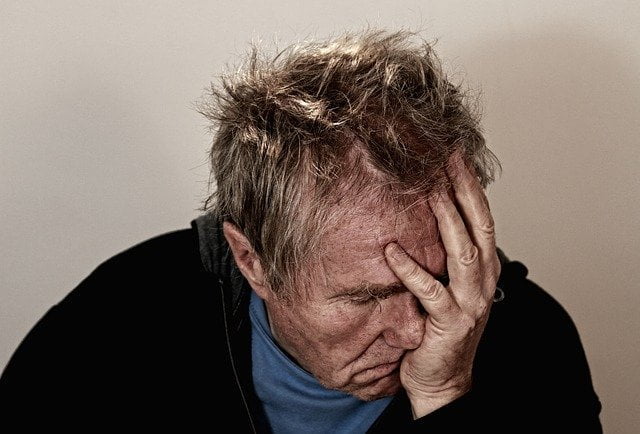
Old man holding his head looking tired at a drug and alcohol rehab in Luton or near Luton
If you are concerned about your own drinking or a loved one, then noticing the signs of alcohol addiction can help you know when to get help and what kind of help is available from a drug and alcohol rehab in Luton or near Luton.
The signs of alcohol addiction can often cross over into the signs of other addictions or physical or mental health issues, so this is also important to bear in mind. However, if you are concerned for a loved one who is displaying these signs, then they are likely to still need help.
- Drinking often and/or drinking alcohol to excess
- Finding evidence of drinking and/or of the after effects of drinking (e.g. finding bottles and cans, evidence of vomit from drinking too much etc.)
- Engaging in risky behaviours when drinking alcohol
- Continuing to drink alcohol even when alcohol has a negative effect on their life or the lives of others around them
- Getting defensive when asked about their drinking
- High tolerance for alcohol
- Being secretive or evasive, particularly when asked about their alcohol consumption
- Neglecting their responsibilities, being withdrawn and/or neglecting their personal hygiene
- Appearing drunk or to have been drinking alcohol regularly (e.g. having slurred speech, bloodshot eyes, red face, staggering or wobbly when walking, changing their personality/behaviour)
- Drinking alcohol for longer than intended and/or drinking alcohol in higher quantities than intended
- Trying or having tried to cut down on alcohol and been unable to
- Having strong urges or cravings for alcohol
- Spending a lot of time drinking alcohol and/or suffering from hangovers and other side effects of drinking alcohol
- Continuing to drink alcohol despite it having a negative impact on key aspects of your life such as relationships or employment
- Neglecting responsibilities and/or not doing things you enjoy such as activities due to drinking alcohol
- Experiencing withdrawal symptoms when not drinking alcohol
If you’ve started to spot the signs of addiction either in yourself or a loved one, then talk to our expert team on 0800 088 66 86
How Do I Know When I Need Drug and Alcohol Rehab in Luton or near Luton?

Two alcohol rehab patients speaking together at a drug and alcohol rehab centre in Luton or near Luton
If you are concerned for yourself or a loved one and worry that alcohol could be impacting your or their life, then the best course of action is to seek help from a drug and alcohol rehab in Luton or near Luton.
A common challenge for people who are able to function whilst having an addiction (e.g. ‘functioning’ alcoholics) is that they often do not recognise that they have an addiction or need drug rehab and alcohol rehab treatment to manage it. [8]
Even if you do not feel like your drug or alcohol use is ‘bad enough’ for you to need drug and alcohol rehab treatment, frequent drug and/or alcohol use can still lead to physical and mental health issues, financial problems and other negative impacts on the lives of the person and those around them.
Addiction can also develop in severity over time, and even people with mild addictions can benefit greatly from addiction rehab.
In fact, being a functioning substance user can often be more dangerous as there is a tendency to deny or ignore the signs of addiction and continue engaging in harmful practices, often leading to physical health issues and other problems.
Having two or more symptoms of addiction as mentioned above (such as drinking often or to excess and being unable to cut down or stop alcohol consumption) can indicate the presence of a drug or alcohol addiction that needs the help of a drug and alcohol rehab to properly address.
Therefore, whether you feel as though you are coping but are still struggling to cut down or manage your drug or alcohol addiction, we highly advise that you seek addiction treatment at a drug and alcohol rehab in Luton or near Luton as soon as possible.
The Rehab Recovery team can help you no matter how mild or severe your addiction is, and there are inpatient and outpatient drug and alcohol rehab treatment options in Luton and near Luton to suit everyone and provide you with the tools you need.
Worried about how addiction is impacting your life? Get help from a drug and alcohol rehab in Luton by calling us on 0800 088 66 86
How Can I Refer Myself to Drug and Alcohol Rehab in Luton or near Luton?

Patient and staff members looking through paperwork at a drug and alcohol rehab in Luton or near Luton
There are different referral types when it comes to drug and alcohol rehab, self-referral, friend and family referral and professional referral.
Most drug and alcohol rehab clinics in Luton will accept self-referrals, where you contact the clinic yourself (or fill out a self-referral form and send it to them) stating that you want to begin rehab treatment.
In order to carry out a self-referral, the first port of call would be to see what drug and alcohol rehab services are available.
This includes drug and alcohol rehab clinics local to you in Luton and near Luton, services available privately and on the NHS, and the types of drug and alcohol rehab treatment which might be most beneficial for you.
Having a chat with a member of the Rehab Recovery team or getting in touch with your GP is a good way to explore your options.
Once you know which drug and alcohol rehab clinic in Luton or near Luton would be best for you, you can find their details and self-referral information online or via your GP/Rehab Recovery.
The drug and alcohol rehab clinic themselves will then have a discussion with you about your addiction, the suitable rehab treatments available and your current circumstances, to figure out what treatment programme would work best for you.
After this you will either be assessed and admitted for drug and alcohol rehab treatment, with a personalised treatment plan put in place for you, or you will be placed on a waiting list and be admitted when a space becomes available for you.
Start the admissions process for drug and alcohol rehab in Luton today by giving us a call on 0800 088 66 86
Pre-Admission Assessment at Drug and Alcohol Rehab in Luton and near Luton

Patient sat with an alcohol therapy group at a drug and alcohol rehab in Luton or near Luton
Prior to considering whether you want to attend a drug rehab and alcohol rehab in Luton, it is essential to assess the severity of the patient’s addiction so we at Rehab Recovery can take active steps towards their recovery.
It can be difficult to know exactly when you are suffering from addiction, as the signs and symptoms can be hard to spot in yourself.
Social alcohol drinking can quickly become binge drinking, which can easily turn into alcohol dependency without the sufferer even realising, and this is true of all substances.
In this light, the DSM-5 model [9] can be implemented as a form of assessing the three levels of severity that a drug and alcohol rehab patient may have in relation to their addiction.
This is a manual for assessing and identifying how severe a drug and alcohol addiction is depending on the number of symptoms that a drug and alcohol rehab client is experiencing.
Some of the symptoms that a client may be assessed on are:
- Impaired control
- Social problems
- Risky use
- Physical dependence
If someone has two or three symptoms they will be classified as having a mild substance use disorder.
Moreover, if someone has four or five symptoms we can determine that they have a moderate substance use disorder.
Lastly, if someone has six or more symptoms, they will be assessed as having a severe substance use disorder. A severe substance use disorder is also classified as having an addiction.
This model is extremely useful as it allows us at Rehab Recovery to concoct a treatment plan in accordance with the severity of their addiction.
If someone is diagnosed as having a severe addiction or labelled as a high-risk drug and alcohol rehab client, they may need a more intense drug and alcohol rehab treatment plan.
Furthermore, the AUDIT (Alcohol Use Disorders Identification Test) [10] is a straightforward and easy way of determining whether someone has an unhealthy relationship with alcohol.
It will determine whether someone has a dangerous or high-risk use, or suffers from any alcohol use disorder. [11]
This model allows us to gather information based on this scoring system:
- 0 to 7 signalling low risk of alcohol use disorder
- 8 to 15 signalling increasing risk of alcohol use disorder
- 16 to 19 signalling a higher risk of alcohol use disorder
- 20 or more signalling possible dependence on alcohol and a likely need for alcohol rehab
If these tests have made you wonder whether or not you would benefit from alcohol addiction treatment in Luton, or from any kind of rehab in Luton, call our team today on 0800 088 66 86
Holding an Intervention for Drug and Alcohol Rehab Treatment in Luton and near Luton
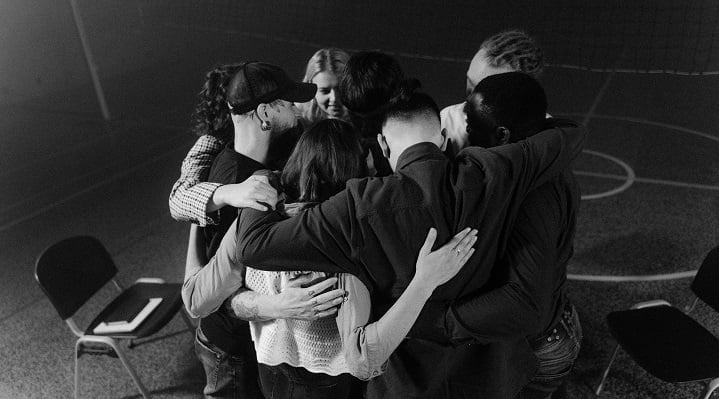
Black and white photo of an alcohol support group at a drug and alcohol rehab in Luton or near Luton
When someone we know has developed an addiction to drugs and alcohol, we may try to leave them to their own devices so that they can get help from a drug and alcohol rehab under their own volition.
Although it is a good idea when someone realises they have an addiction by themselves, unfortunately, many who do have an addiction to drugs and alcohol do not realise the severity of their situation ot their need for proper drug and alcohol rehab treatment.
They may even be blindsided by their own actions and their frailties. Or, in other situations, they could be defensive and dismiss any concerns about their behaviour.
If you are concerned about someone you know who cannot admit that they have an addiction, we understand that you may feel as though you are at a standstill and you may not know which way to turn.
There are many misconceptions about addiction, but at Rehab Recovery we want to reassure you that addiction is not the result or manifestation of a moral failure. Rather, it is a disease of the brain.
You can read more about the disease of addiction here. [12]
At Rehab Recovery we would propose the idea of staging an intervention. This is known as a process whereby those who are worried about someone with an addiction intervene and attempt to help them.
They usually will express their concerns in an attempt to encourage them toward recovery.
Another idea would be to use the services of a professional interventionist which will equip you with methods that will allow you to communicate effectively with this person without coming across as threatening or intimidating.
They will also be able to advise you about drug and alcohol rehab services in Luton and near Luton that may be suitable for your loved one.
When considering staging a drug rehab or alcohol rehab intervention, one could also adopt the Community Reinforcement And Family Training (CRAFT) approach. [13]
CRAFT prioritises communicating with the person in question and changing certain habits so that the addicted person can recover in the long term.
This approach also takes into consideration those who have been affected by a person’s addiction so that they can help in continuing to ward it off after their time at a drug and alcohol rehab in Luton or near Luton has been concluded.
For guidance hosting an intervention in Luton in order to help a loved one enter rehab in Luton, call us today on 0800 088 66 86
How Do You Treat an Addiction at Drug and Alcohol Rehab in Luton?

Two people holding a sapling at a drug and alcohol rehab in Luton or near Luton
The ASAM criteria [14] is a body of guiding principles that is useful for treating patients with addictions to drugs and alcohol. It has six dimensions.
The first part of this assessment is ‘Acute Intoxication and Withdrawal’. This will assess plans for drug or alcohol withdrawal management and the level of care that will be required for the person who is addicted.
Secondly, this model addresses ‘Bio-Medical Conditions and Complications’. In summary, this will focus on how a patient has been physically affected by their addiction and how we can help via care or physical health services.
In the third instance, this model will also deal with ‘Emotional, Behavioral or Cognitive Conditions and Complications.’
This entails obtaining treatment for a co-occurring mental health disorder that has been worsened or caused by their addiction.
In a similar vein, the fourth part of this model will garner an idea of the patient’s willingness to submit to the prospect of change. If we assess that the patient is not eager to engage fully in their recovery, we may have to invoke motivational enhancement strategies.
Alternatively, if the patient has completely embraced their journey of change, we will put action into motion for their recovery.
The fifth section of this model concentrates on the prospect of relapsing and the plan we must execute if the patient does not break their substance abuse cycle.
This means contemplating their relapse prevention services and warning the patient of the consequences of falling back into old habits. Lastly, the model focuses on the importance of a solid and structured drug and alcohol rehab recovery environment for the patient.
This includes gauging the need for certain individualised family or partners, housing, financial, vocational, educational, legal, transportation and/or childcare services.
For many patients, addiction is not simply an isolated issue. At Rehab Recovery, we also treat those who are coming in with a dual diagnosis. This simply means that their addiction is a symptom of underlying mental health problems.
- Schizophrenia
- Bipolar Disorder
- Eating disorders
- Depression
- Generalised Anxiety Disorder (GAD)
- Borderline Personality Disorder (BPD)
- Obsessive Compulsive Disorder (OCD)
- Attention Deficit Hyperactivity Disorder (ADHD)
- Post Traumatic Stress Disorder (PTSD)
- Codependency
In this context, if you attending a drug and alcohol rehab in Luton or near Luton, we aim to treat those with a dual diagnosis with evidence-based rehab treatments.
Many organisations across the UK offer free mental health support, whether you are also suffering from addiction or not.
Some of these include Mind UK, Young Minds, Rethink Mental Illness, Samaritans and Papyrus.
To learn more about diagnosing addiction at rehab in Luton, and to find out how addiction treatment in Luton can help support your mental health, call us today on 0800 088 66 86
What is the Difference Between Residential and Outpatient Drug and Alcohol Rehab in Luton?

Outdoor photo of a rural drug and alcohol rehab
Staff at a drug and alcohol rehab will advocate for complete abstinence, which simply means not using alcohol or drugs. Experts have agreed [15] that abstinence is always the safer and more effective route to addiction recovery.
In one aspect, this will be made easier for our patients if they opt for a residential drug rehab and alcohol rehab in Luton as they are kept away from the temptation of using drugs and alcohol.
Accessing a private rehab in Luton may seem like an expensive option. However, private rehab may have benefits over statutory services.
By disengaging completely from drugs and alcohol, not only will the patient will be able to focus wholly on their recovery, but their relationships, self-esteem and financial possibilities will increase dramatically.
Being given the opportunity to practice sobriety is just one of the many benefits of choosing a residential drug rehab and alcohol rehab in the Luton area.
As mentioned, choosing residential drug rehab and alcohol rehab will remove the patient from external temptation but it will also offer them a set structure and gives them time and space to recover.
Residential drug and alcohol rehab programmes also offer specialist care and are also linked to higher levels of recovery success.
So why opt for attending private drug rehab and alcohol rehab as opposed to council-funded drug and alcohol rehab in Luton or near Luton?
Firstly, private rehabilitation offers tailored treatments that are customised to fit your needs.

Two people talking together about alcohol addiction at a drug and alcohol rehab in Luton
It also means that you can choose to enrol on a detoxification treatment programme as well as get to the root cause of your issues with your addiction to drugs and alcohol.
For instance, you can begin drug and alcohol rehab straight away.
Council-funded drug & alcohol rehab treatment in Cheshire may mean you may be subject to a ‘waiting list’ before you become ‘eligible’ for treatment.
However, although most private drug rehab and alcohol rehab facilities in Luton allow visits from family members, for some it can feel like an isolating experience as you are removed from your natural environment.
In this way, if you opt for outpatient drug and alcohol rehab treatment in Luton, you will be able to schedule your recovery around your daily habits and your routine.
This means you will not have to completely uproot your life or take time off of work.
In this sense, whether you choose private or outpatient drug and alcohol rehab treatment is subject to your individual preferences, the severity of your addiction and financial implications.
For more help choosing between private and public rehab in Luton, give our team a call on 0800 088 66 86
Can I Recover From Addiction Without Professional Drug and Alcohol Rehab in Luton or near Luton?

Doctor taking notes at a drug and alcohol rehab in Luton or near Luton
Attempting to recover from an addiction without professional help is not advisable for a variety of reasons, including the lack of addiction therapies, lack of professional diagnosis for comorbid disorders and the potentially fatal health risks.
The first stage of drug and alcohol rehab is typically detox, where a person will first stop taking the addictive substance/s. This is essential to start the recovery process, but it is not as simple as it sounds.
Due to the nature of addiction, giving up the substance you are addicted to can be incredibly difficult.
Doing it alone and without professional support can be even harder, as there are no healthcare professionals there to stop you accessing drugs or alcohol, provide care or provide medications to help lessen cravings and help with withdrawal symptoms.
Furthermore, some substances can be dangerous to come off of, especially if you are not prepared for the withdrawal symptoms.
Alcohol and heroin (opioids) can both have severe withdrawal symptoms when an addicted person stops taking them, including symptoms which can lead to death such as seizures and heart spasms.
If you are recovering from marijuana use, cocaine dependency or a less severe addiction, then although trying to recover alone may not be dangerous, it is still unlikely to be the most effective form of rehabilitation.
In professional addiction recovery in Luton, you will be working with experts in the addiction field, provided with tools to manage your addiction, have the opportunity to discuss your thoughts and emotions throughout the process and you will be provided with relapse support and aftercare long term.
Addiction therapies such as counselling, family therapy, group therapy and aftercare support groups can provide insight into the causes of your addiction as well as offering support when your addictive thoughts occur and relapse is more likely.
If you attempt rehab alone, then it is much harder to fight relapse and to get back into recovery once a relapse occurs.
Professional addiction specialists can also help you find support for any co-occurring mental health issues which might interact with your addiction.
By undergoing professional rehab treatment, you can make sure you have the best chance at recovering from your addiction.
Don’t take the risk of recovery without support – get the help you need from a first-class drug and alcohol rehab in Luton by calling us on 0800 088 66 86
What is the Cost of Drug and Alcohol Rehab in Luton or near Luton?
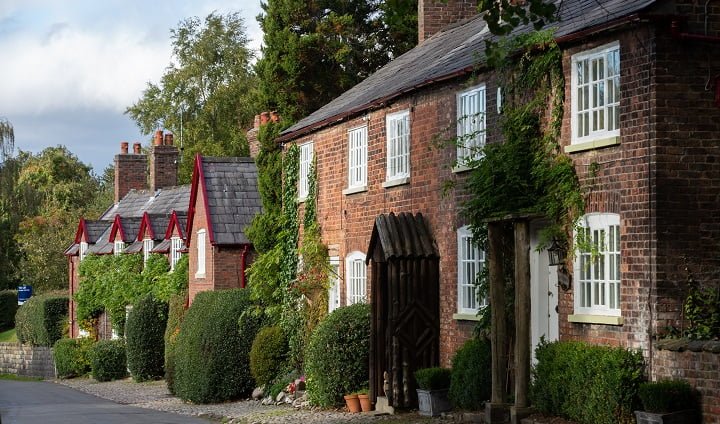
Outside photo of a residential drug and alcohol rehab
One of the primary concerns of those who are considering attending a drug and alcohol rehab in Luton is the price of doing so.
There is no uniform nor set price for attending rehab as it is adjusted according to the rehabilitation centre you choose, the duration of your stay and the type of room/accommodation you select.
For those who need a 10-day detox with a single occupancy room, the lowest price that we offer will be £3,000 and the highest will be £6,000. The cost of a multi-occupancy room will fluctuate between £2,000 and £4,000.
If you believe that you will reap more benefits from a 28-day stay, then you will be expected to pay from £8,000 to £12,000 for a single occupancy room, or about £6,000 for a multi-occupancy room.
In other cases, those who seek a high level of independence in their recovery choose to complete an at-home drug and alcohol detox.
If you decide to choose this option the cost is roughly £1,500 for a home drug and alcohol detox.
Will My Insurance Cover Drug Rehab and Alcohol Rehab in Luton?
If you are considering private drug and alcohol rehab in Luton, then you might be wondering whether your treatment will be covered by your insurance.
Insurance companies such as Aviva, BUPA and AXA offer some insurance policies which do cover addiction treatment, however whether you are covered will depend on your own policy.
Check your insurance policy and, if you need to, have a chat with your insurance provider to check whether your drug and alcohol rehab is covered or not.
Policies will also vary in terms of how much treatment is covered and the type of treatment that is covered. Some policies will cover an entire 28-day inpatient stay in rehab, whereas others might only cover outpatient treatment.
Whether you are looking into personally-funded private rehab, free NHS rehab or private rehab which is covered by your insurance, the Rehab Recovery team is happy to discuss your options with you.
For a more specific answer to how much your time at rehab in Luton will cost and advice on how to pay for it, call us today on 0800 088 66 86
How Do I Choose the Right Drug & Alcohol Rehab in Luton or near Luton?

Therapist and patient talking together about alcohol addiction at a drug and alcohol rehab in Luton or near Luton
Just as not everyone’s journey with addiction is the same, no two drug and alcohol rehab centres are exactly the same, and no two patients will experience identical treatment programmes.
hilst a large portion of rehabs advocate for a 12-step approach some others adopt a different therapeutic approach.
There are a few things you should consider before committing yourself to a particular programme of addiction treatment in Luton.
It is recommended that you select a rehab that has a substantial and credible track record. If a rehab has been running for at least 20 years there is more chance that you will receive high-quality drug rehab and alcohol rehab support.
Moreover, you should be determined whether the rehab in Luton you are selecting has a solid success rate as well as a good reputation.
In terms of cost, you will also need to make sure that the drug and alcohol rehab you choose is financially viable for you and will not plunge you into debt.
For more help choosing the perfect drug and alcohol rehab in Luton for you, call us today on 0800 088 66 86
What is the Detoxing Process at a Private Drug Rehab & Alcohol Rehab in Luton?

Woman holding a coffee cup and looking at the sea after staying at drug and alcohol rehab in Luton or near Luton
If you are addicted to drugs or alcohol you may be questioning whether it is a wise idea to undergo drug or alcohol detox in a private rehab in comparison to detoxing in a free rehab.
If you have been using alcohol or drugs or alcohol for a substantial body of time, you can become physically dependent on these substances.
This will actually require you to detox from these substances in order to recover from them.
This is relevant to those substances that cause physical dependence, such as alcohol, heroin, ketamine and benzodiazepines.
Other addictions do not require detox, such as behavioural addictions (i.e gambling addiction), cocaine dependence and cannabis use disorder.
A medically-assisted detox can be a key step in minimising the extent of drug or alcohol withdrawal symptoms and making sure that the detox process is safe and effective.
For alcohol detox, the substance Librium, also known as Chlordiazepoxide, is extremely effective at reducing the effects of alcohol withdrawal syndrome.
Librium is used to treat anxiety as well as alcohol withdrawal symptoms, which can make detoxing stressful and even dangerous in the case of such as delirium tremens and alcohol seizures.
Heroin detox is extremely important to ensure a safe recovery, not just for heroin addiction but also for any opioid use disorder. Medications like methadone and buprenorphine are widely used to make heroin withdrawal a much safer process.
Many physical conditions induced by addiction also need to be taken into account during detox.
These are widespread and depend on the specific addiction, but some of the most common encountered at drug and alcohol rehab are: <d/iv>
- Liver failure
- Hepatitis
- Heart issues
- Blood pressure issues
- Brain damage
- Gastrointestinal issues

Staff member typing on a laptop at a drug and alcohol rehab in Luton or near Luton
Despite the necessity for a detoxification process to occur, many of those who are addicted to drugs and alcohol cannot pay to be monitored during this process, so they choose to undergo a drug and alcohol detox at home.
However, detoxing at home has its downsides as there may be extreme withdrawal symptoms that can be so severe they may result in death.
Some of these symptoms can be headaches, shakiness or tremors, sweating, vomiting or nausea, insomnia or tiredness, depression or anxiety, dilated pupils or decreased appetite.
With the risk of such symptoms, it is much better to be under professional supervision where you will be monitored safely.
It is a preferable option to quitting cold turkey as this is an extremely risky thing to do.
To learn more about how a rehab in Luton will help you detox safely and effectively, call our expert team on 0800 088 66 86
What Medications May Be Prescribed During Drug & Alcohol Rehab in Luton or near Luton?
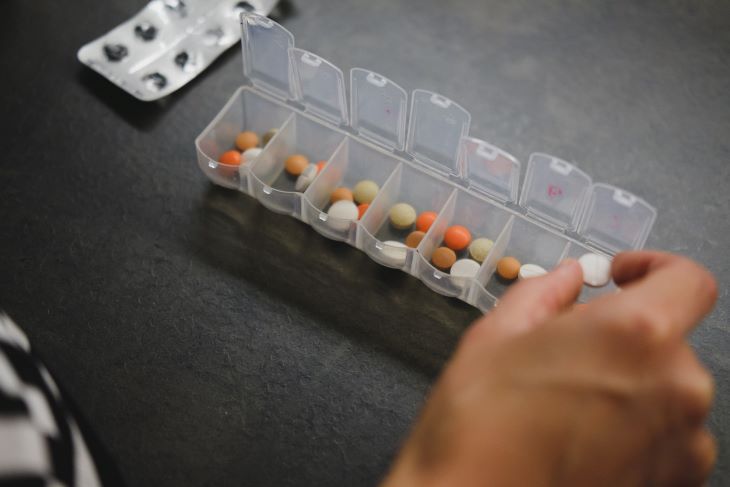
Person taking pills from a box at a drug and alcohol rehab in Luton or near Luton
During your addiction treatment in Luton, you may be prescribed medication as part of your treatment programme.
This could be to help lessen the severity of withdrawal symptoms, help with cravings and/or to treat a co-occurring condition.
Medications prescribed to help with aspects of addiction itself are commonly prescribed for moderate to severe addictions, especially for substances such as alcohol and heroin.
Some commonly prescribed medications used for alcohol detox include Librium (chlordiazepoxide) and Valium (diazepam) which are benzodiazepines used to help lessen withdrawal symptoms such as anxiety and seizures.
Barbiturates might also be used, usually in cases when benzodiazepines are unsuccessful or unable to be used (e.g. if someone also has an addiction to benzodiazepines).
Disulfiram and Naltrexone are also used for alcohol addiction, but these can be used throughout the treatment process including after detox. Disulfiram, for example, reacts to the ethanol in alcohol making drinking alcohol an unpleasant experience for the drinker.
Medications used for opioids such as heroin include Methadone, which both reduces withdrawal symptoms and helps limit the euphoria felt if they do take the drug, and Suboxone, which also blocks the euphoria when an opioid is taken.
To learn more about the various medications that may be used during rehab in Luton, talk to our experts on 0800 088 66 86
What is Relapse Prevention Planning at Drug & Alcohol Rehab in Luton?
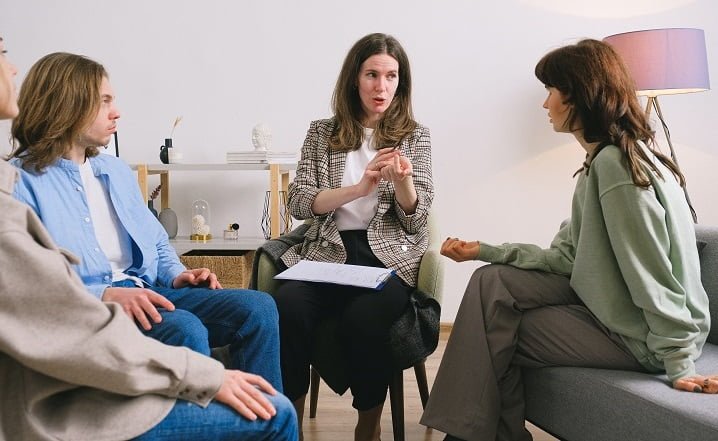
Therapist speaking with an alcohol support group at a drug and alcohol rehab clinic in Luton or near Luton
At Rehab Recovery, we work with drug and alcohol rehab centres in Luton that offer outstanding rehab aftercare services.
Unfortunately, if you have enrolled on a treatment programme by attending a drug and alcohol rehab in Luton, there is the possibility of relapsing.
This is why we offer a relapse prevention plan for our clients so that they can sustain their sobriety and commit to a life of prioritising their recovery.
This will entail concocting a written document that includes the addicted person’s own triggers, fears, cravings and coping strategies.
This will assist you with staying zeroed in on your recuperation, and perceive any personal conduct standards that could lead you to do something dangerous to your sobriety.
It will likewise assist you with understanding the sorts of triggers that you might run over by zeroing in on the physical, mental and emotional backslide.
While making a relapse prevention plan, our staff will evaluate your very own set of experiences and whether or not you have backslid previously.
If you have backslid previously, we should have the option to recognise the notice signs that another relapse could be approaching.
This will permit us to keep the chance of backsliding under control in the event that we realise what drives you to do as such in any case.
Finally, you should be aware of things you can do as opposed to enjoying drugs and alcohol by talking about individuals who you can converse with or get support in case you are verging on backsliding.
Having different exercises or side interests set up for when you are carrying on with distressing difficulties in your day-to-day existence will boost your odds of keeping up with your moderation.
Another chance when you are attempting to fight compulsion is encountering desires.
As a component of our backslides counteraction plan, we will urge you to know about the longings that you are having and on second thought rehearse solid ways of dealing with stress.
Aftercare will likewise involve encouraging you to survey your recuperation plan now and again as your triggers and your yearnings may not stay stable and the occasions in your day-to-day existence are continually in transition.
To learn more about how drug and alcohol rehab in Luton can help you avoid relapse in the future, call our team on 0800 088 66 86
What Happens After Drug & Alcohol Rehab in Luton or near Luton?

Alcohol support group stood with their hands together at a drug and alcohol rehab clinic in Luton or near Luton
After you complete rehab, you will be provided with an aftercare plan which includes any ongoing treatments (e.g. outpatient therapy or medications), resources for independent recovery, aftercare services contact details and a relapse prevention plan.
Your aftercare plan is in place to help you on your journey of independent recovery, and will help you access any ongoing support, or one-off support, you need after you complete treatment.
The aftercare services which you can access after you complete treatment, might include local support groups in Luton, 12 step programmes, crisis hotlines or online resources.
Aftercare plans should also incorporate other elements which affect recovery such as housing and employment, as well as support in finding hobbies and other things that you want to do to help you in your sober life.
These aftercare services are designed for people recovering from an addiction, and can be utilised whenever you feel as though you need additional support.
How Long Does Aftercare Last After Drug Rehab and Alcohol Rehab in Luton?
Aftercare is the support provided after you complete drug and alcohol rehab and are on the path to independent recovery.
Whether you have established ongoing treatment once you leave inpatient rehab or not, your aftercare plan will also include aftercare services which can be accessed at any time they are needed.
They can be accessed for any length of time after treatment including years into recovery. However, there is a general timeline that is advised to ensure that people get the support they need at the right time.
In most cases, aftercare will be utilised up until 1 year after you leave treatment. This will often come in stages, with more intense aftercare (such as halfway houses and accommodation support) being used immediately, and monthly support meetings or help with hobbies occurring in the last few months.
During this time, and after, you might need ongoing support through regular peer support meetings in Luton or one-off help if you are struggling with something such as a trigger or thoughts of relapse. Each aftercare plan is catered to the individual.
Aftercare is an incredibly important aspect of addiction treatment, and it is important that you complete your treatment programme and access these aftercare services as and when needed to achieve the best outcome possible.
Aftercare services are there so that you can recover independently but can always have the support you need to continue on the path of addiction recovery.
Ensure that your stay at a drug and alcohol rehab in Luton will be matched by an equally effective aftercare plan by calling our admissions team on 0800 088 66 86
What are the Alternatives to Drug & Alcohol Rehab in Luton and near Luton?

People walking through the woods during outdoor therapy at a drug and alcohol rehab clinic in Luton or near Luton
Professionally supported drug and alcohol rehab in Luton is one of the best ways to recover from addiction.
However, when discussing addiction recovery it is important not to neglect other forms of treatment.
One extremely popular treatment option is that of Alcoholics Anonymous (AA), [16] Narcotics Anonymous (NA) [17] and Cocaine Anonymous, [18] which are 12-step programs encouraging those who are addicted to take steps towards sobriety, relying on the support of their peers as well as the opportunity to lean on a higher power when addiction seems overwhelming.
Various specialist groups also exist, including Al-Anon Family Group Meetings [19] and Alateen, [20] who provide services specifically for adolescents.
Once a person has pledged a willingness to change, they are usually encouraged to share their struggles in a group setting and act in accordance with the groups guiding principles.
Another option for those who are struggling with addiction is SMART Recovery.
This helps patients by implementing a program that aims to provide tools and techniques to aid their recovery.
SMART Recovery [21] offers a more secular approach to mutual support.
It also entails making goals both in the short and long term as well as coping with unhealthy thoughts and urges in accordance with alcohol. Of course, there is also the option to carry out a home detox and outpatient drug and alcohol rehab treatment as listed above.
Alcoholics Anonymous in Luton and near Luton
Alcoholics Anonymous is a global community of people in recovery from alcoholism, who meet up in local, peer-led groups all around the world.
The group is open to anyone, of any age, who wants help overcoming their alcohol dependency.
It is also free to join and there are no fees for attending meetings, joining a local group or becoming a member.
There are both closed and open meetings, open meetings for any member of the public for example, family members or friends who want to attend with their loved one and learn about AA and alcoholism more generally.
Closed meetings are for members of AA, so those who struggle with alcohol addiction specifically and is a safe space for them to discuss their drinking and get help for their personal struggles.
They offer a self-help, peer-supported environment within which people can meet with others who are also struggling with alcohol addiction, and help one another to manage their addiction, get sober and remain sober.
New members can also have a sponsor, which is an experienced member of AA who can provide support and guidance to the new member. This will be the person that they can turn to if they need support at any time.
AA does this through meetings where the local AA group will come together and discuss their experiences, emotions, thoughts and go through weekly topics as well as the 12 steps outlined below.
Although AA meetings are informal, there is a structured approach to recovery which every member is encouraged to take. This is why AA is classified as a 12 step programme, where there are 12 distinct steps one takes to recover from alcohol addiction.
There are estimated to be at least 100,000 AA groups around the world [22] and Alcoholics Anonymous has been shown to be a very effective method of recovering from alcohol addiction.
If you want to join your local AA in Luton, get in touch or pop along to an open meeting to see if it’s the right treatment method for you.
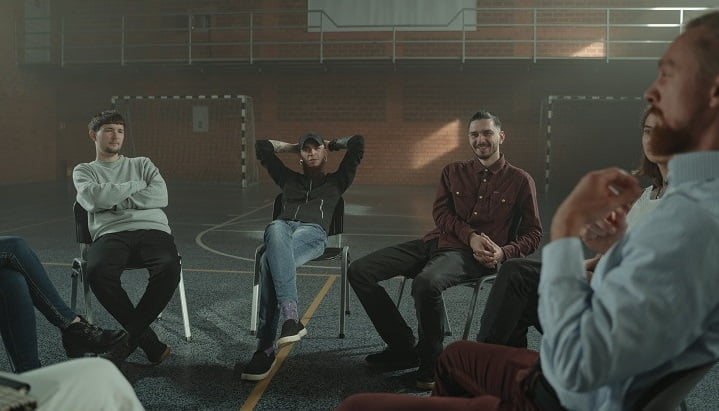
Alcohol support group talking together at a drug and alcohol rehab in Luton or near Luton
Narcotics Anonymous in Luton and near Luton
Narcotics Anonymous is a global society of people who want to recover from drug addiction and meet up to go through the 12 step recovery process together.
It is related to Alcoholics Anonymous (AA), and is a branch of the organisation which helps people with other substance abuse and addiction issues. It is the largest 12 step programme for drug users in the world.
Like AA, it is free to join and is open to anyone, of any age and circumstance.
It follows the 12 steps of AA (outlined below), and uses the same methods of recovery and sobriety as AA does, including following the 12 steps such as admitting past faults, making amends and admitting that one is powerless over their addiction.
However, whereas Alcoholics Anonymous focuses on having faith in a higher power and the individual being powerless to alcohol, Narcotics Anonymous is more focussed on the individual and being powerless to addiction itself.
Narcotics Anonymous meetings, like AA meetings, also focus on open discussions, sharing experiences and creating a supportive environment for all. New members can also have a sponsor, who will support them and help them get and stay sober.
NA also hosts open meetings for friends, family and others as well as closed meetings for members of Narcotics Anonymous.
Narcotics Anonymous and Alcoholics Anonymous have both been shown to be very effective in treating drug and alcohol addiction [23] and helping people achieve long-term sobriety with or without the help of formal drug and alcohol rehab treatment.
NA operates worldwide, so if you want to join NA, attend an open meeting or just see what Narcotics Anonymous might be like then get in touch with your local group in Luton.
SMART Recovery in Luton and near Luton
Self-Management and Recovery Training (SMART) is another self-management method of addiction recovery which can help people addicted to drugs and/or alcohol to manage their addiction.
It is used at many rehabilitation centres in Luton as well as by the charity, ‘SMART Recovery’, itself, and they run in-person and online mutual support groups.
During these groups, people going through Smart Recovery can support one another whilst they design and implement their own recovery plans.
The focus in Smart Recovery is on the individual’s ability to change their behaviour and take charge of their recovery. It helps participants to face their problem, find the motivation to change their behaviour and use the tools that Smart Recovery provides to manage their addiction.
This method puts the power in the individual and is an individualistic, secular, science-based and self-motivated approach to addiction recovery.
Smart Recovery is also often used in conjunction with CBT, or as a part of it, as both focus on the individual challenging and changing their own behaviour and thought processes.
Whatever help you need to beat addiction, get the very best by calling our experts on 0800 088 66 86
Statutory-Funded Drug Rehab & Alcohol Rehab Services in Luton and near Luton

Two people having a serious conversation at a drug and alcohol rehab in Luton or near Luton
1. ResoLUTiONs Drug and Alcohol Support – Change Grow Live Luton
Address: 2, 12 Victoria St, Chapel Langley, Luton LU1 2UA
Telephone: 08000 546 603
Website: http://www.resolutions4luton.org/
2. Turning Point Drug and Alcohol Support – Bedford & Luton
Address: 18 Franklin Ave, Barton-le-Clay, Bedford MK45 4HF
Telephone: 01582 883 465
Website: https://www.turning-point.co.uk/
3. Path 2 Recovery Dunstable – Drug and Alcohol Support
Address: 67 High St N, Dunstable LU6 1JF
Telephone: 03333 324 019
Website: https://changeyourtomorrow.co.uk/#areas/elft/pages/Home
You can reach out to a number of remote services, such as the National Institute for Health and Care Excellence (NICE), [24] Turning Point, [25] We Are With You, [26] Change Grow Live [27] and the National Association for Children of Alcoholics. [28]
If you are suffering from too many temptations and triggers in your home life, you may also be able to gain temporary residence in a sober living house.
The National Health Service [29] can also provide information and resources for issues surrounding drug and alcohol, as well as direct support through a local NHS Foundation Trust.
Begin your journey to sobriety with one of the many alternative addiction treatments in Luton – call our team today on 0800 088 66 86.
Tips for Choosing the Right Drug & Alcohol Rehab in Luton or near Luton
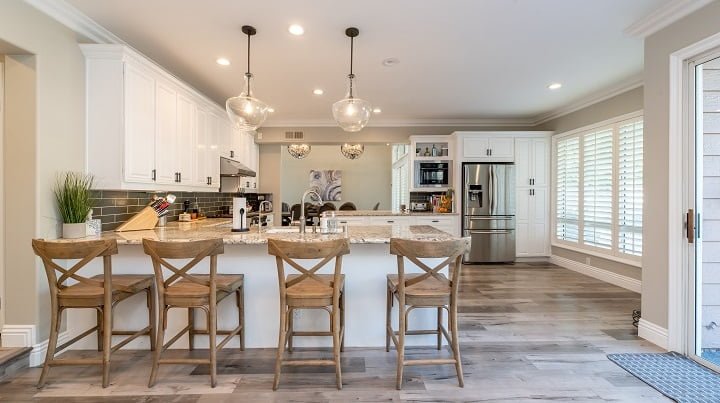
Photo of a kitchen at a residential drug and alcohol rehab centre
Addiction is not a ‘choice’ or ‘moral failing’ on behalf of the addiction sufferer [30] – the focus of rehab is always on treating the disease of addiction.
If you are anxious about making the correct choice with regard to your recovery, OK Rehab can assist you in choosing the best possible option.
One thing you may need to consider is the distance of the rehab centre from your home. If you struggle with being away from your typical environment, you may want to opt for a rehab clinic that has a shorter radius within the Luton area.
Again, you will need to consider whether you want to opt for inpatient or outpatient drug and alcohol rehab treatment in Luton. Choosing between these options should also narrow down your choices.
You should also contemplate the length of time that you are willing to commit to your treatment plan.
This could be affected by how much you can afford to spend as well as the severity of your addiction.
Moreover, it is worth considering the reputation and reviews of the clinic that you are considering in the Luton area.
All treatment centres in the UK should be registered and inspected by the Quality Care Commission or Health Improvement Scotland. You should also see if other patients have been satisfied with their treatment plans.
Lastly, it is wise to not simply choose the first rehab clinic that you see. You should compare drug and alcohol rehab clinics to narrow down your choices in accordance with all of the factors listed above.
You will then be able to make a fully informed and logical decision.
Start your recovery journey at rehab in Luton by calling our expert team today on 0800 088 66 86
Cocaine Rehab in Luton and near Luton

Patient and therapist speaking together at a drug and alcohol rehab in Luton or near Luton
Although cocaine/crack is not physically addictive, it is a very potent drug that elevates the levels of dopamine in your body.
Eventually, your body will get used to this level of dopamine and you will become reliant on cocaine. Unlike alcohol, quitting cocaine does not produce physical withdrawals and there is no need for medical detox.
However, cocaine is a class A drug that has a plethora of adverse short and long term health effects, including causing heart, kidney, brain and lung damage.
Of course, like alcohol addiction, you will need to engage in a credible treatment plan in order to reverse it. Like alcohol rehab centres, with cocaine addiction, there is also the option to choose inpatient treatment and outpatient treatment.
With both cocaine and crack cocaine addiction, it may also be necessary for the patient to engage with Cognitive Behavioural Therapy (CBT) to focus on their thought patterns in order to adopt more healthy coping mechanisms.
Another typical type of therapy is Multidimensional Family Therapy (MFT).
This looks at the changes in symptoms of the individual affected by opening conversations within the family. Moreover, the MFT method advocates for social engagement in order to facilitate their recovery.
Beat your cocaine addiction today with the help of a rehab in Luton – call our team on 0800 088 66 86
Heroin Rehab in Luton and near Luton

Individual alcohol therapy session at a drug and alcohol rehab in Luton or near Luton
Like alcohol, heroin is a physically addictive drug, which means that the person attending a heroin rehab in Luton will initially be required to do a heroin detox to help treat physical withdrawal symptoms.
Addressing and undoing an addiction to Heroin typically consists of therapy, medication, support groups, and advocating for lifestyle changes.
These treatments can be accessed at both inpatient and outpatient rehab centres. Inpatient Heroin rehab usually lasts between 30 and 90 days but may last longer in some cases.
As the use of heroin is tied to severe psychological implications, a treatment centre quintessentially offers the highest rates of a long-lasting recovery.
In terms of detox, the patient is encouraged to choose a rehab where there are a host of professionals who are able to manage and monitor the process of heroin detoxification.
Medical management is vital in getting addicted patients off heroin by diminishing cravings and discouraging future use.
Beat your heroin addiction today with the help of a rehab in Luton – call our team on 0800 088 66 86
Cannabis Rehab in Luton and near Luton

Pictures of smoke
Although cannabis is not physically addictive and quitting cold turkey doesn’t produce physical withdrawals like heroin and alcohol, cannabis addiction is still a huge problem in the UK and worldwide.
It is a psychologically addictive drug that can lead to users complaining of feeling nauseous, paranoid or anxious.
It has also been proven to negatively affect your heart rate and blood pressure as well as produce hallucinations and even brain fog.
In recent years, cannabis has gotten a reputation for being a harmless drug despite the fact that addiction occurs in 10% of people who are exposed to the drug.
With this claim comes the tendency for people to claim that rehab is not necessary for those who use cannabis.
However, this drug has the capacity to inflict severe harm to mental wellbeing, job prospects and finances as well as having negative ramifications on familial and romantic relationships.
Therefore, if you have a reliance or addiction to cannabis in the Luton area, it is advised that you seek out a rehab facility to aid you in your recovery.
Beat your cannabis addiction today with the help of a rehab in Luton – call our team on 0800 088 66 86
What Addiction Therapies Are Available at Drug and Alcohol Rehab in Luton and near Luton?
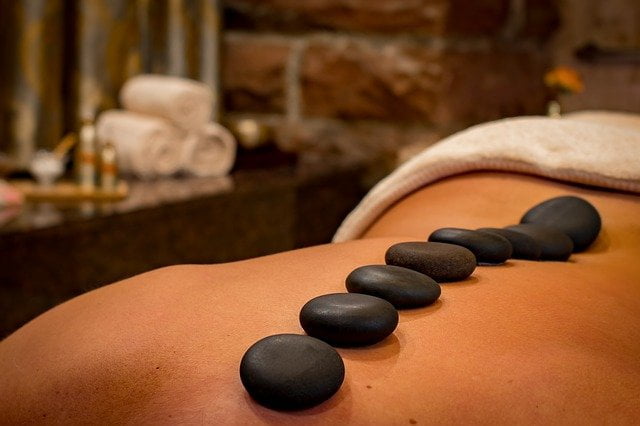
Person receiving a hot stone massage during a holistic therapy session at a drug and alcohol rehab in Luton or near Luton
Of course, there are other therapies on offer in Luton which target the underlying mental causes of addiction and tackle co-occurring disorders.
These include Cognitive Behavioural Therapy (CBT) and Dialectical Behavioural Therapy (DBT) as mentioned previously.
Motivational Interviewing (MI) is also a therapeutic technique used to deal with drug and alcohol addiction in patients by heightening a patient’s drive and engagement with a certain goal, in this instance, it would be refraining from harmful substances. This is just one kind of motivational therapy that you could experience whilst at rehab.
Lastly, there are also holistic therapies available to treat addictions for example tai chi, yoga, meditation, mindfulness, massages, music therapy, art therapy, acupuncture, equine therapy, drama therapy and aromatherapy.
There is a multitude of benefits to engaging with these types of therapies, including stress reduction and relief, reducing the likelihood of relapse by endowing you with a sense of purpose, improving your health, as well as strengthening your sense of identity and elevating your self-esteem.
- Group Therapy and Group Psychotherapy
- Individual Therapy
- Brief Intervention
- Eye Movement Desensitisation and Reprocessing (EMDR)
- Twelve-Step Facilitation Therapy (TSF)
- Acceptance and Commitment Therapy (ACT)
- Contingency Management
- Rational Emotive Behaviour Therapy (REBT)
To access some of these treatments through a drug and alcohol rehab in Luton, call our team today on 0800 088 66 86
What Should I Expect at Drug & Alcohol Rehab in Luton and near Luton?

Alcohol support group taking notes at a drug and alcohol rehab in Luton or near Luton
It is understandable that people feel nervous about choosing an option like drug and alcohol rehab in Luton.
It can feel like a real step into the unknown, and the person has many misconceptions or has been told horror stories of what it actually involves.
When people first arrive in their chosen facility they will undergo a complete assessment. This is similar to an assessment conducted by a doctor, but it will usually involve a great deal more information.
The purpose of these psychiatric assessments is to establish the person’s specific needs.
The assessment is used by your psychiatrist and rehab specialists to create a person-centred care plan for the individual that is specialised to address their specific needs.
The specific nature of the assessment will vary, but often consists of pre-set frameworks that we have already mentioned, such as the ASAM (American Society of Addiction Medicine) Criteria and Dimensions, [31] the AUDIT (Alcohol Use Disorders Identification Test), [32] the Diagnostic and Statistical Manual of Mental Disorders 5th Edition (DSM-5), [33] and the CAGE Questionnaire. [34]
It is important to keep in mind that this plan will not be set in stone. It needs to be regularly evaluated in light of progress made and where necessary changed.
The individual will be expected to follow rules and regulations during their stay in rehab. This is to ensure that they can get the most out of the program and that they do not prevent other people from getting the most out of the program.
One of the most important rules is that the individual remains completely abstinent from alcohol or drugs during their stay.
It is usual for the individual to attend group therapy sessions on most days of the week. The aim here is for the individual to share their thoughts, experiences, and beliefs about recovery and to get feedback.
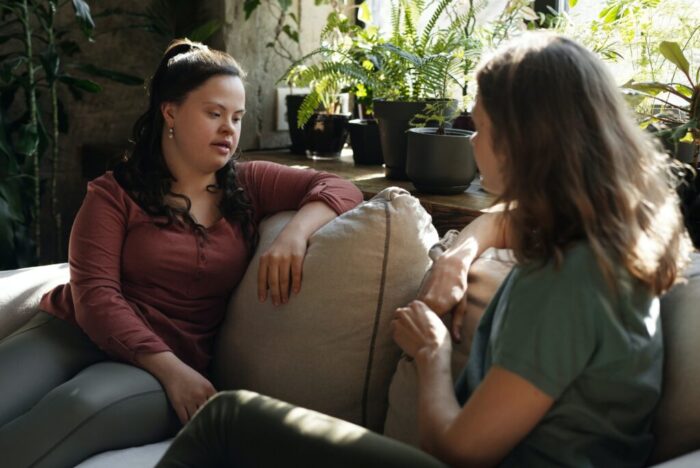
Two people sharing a conversation at a drug and alcohol rehab centre in Luton or near Luton
There will be rules for how the group is managed, and these are usually agreed upon by members of the group beforehand. These sessions are usually moderated by a therapist but most of the work in them will be done by the group itself – they are in charge.
There will also usually be one-to-one sessions where the individual will get to discuss their history, worries, and concerns with a therapist.
The aim will be for them to dig deeper into the causes of their addiction and to plan for the future. The therapist is not there to tell the person what to do, but to assist them in deciding what they want to do.
It is usual for each client to have a key worker.
This will be one member of the team that takes a special interest in them.
It will usually be the key worker that will have their one-to-one therapy sessions.
The individual will be expected to be honest and open during their time in recovery.
If they are not able to do this it will not be possible for them to make any real progress. Almost all the different aspects of addiction recovery in rehab involve some type of honesty.
The client in this type of facility has the responsibility of getting the most out of the program.
All a rehab can really do is provided the right environment and the right tools, but it will always be up to the person to make the most of this.
Get the best possible help at a drug and alcohol rehab in Luton by giving our team a call on 0800 088 66 86
How Do I Contact Rehab Recovery About Drug & Alcohol Rehab in Luton Today?

Person typing on a phone at a drug and alcohol rehab in Luton or near Luton
For more information on detox and drug rehab in Luton, contact Rehab Recovery today on 0800 088 66 86.
When you contact us, we shall outline a variety of treatment options that are available to you in Luton.
This includes both private and statutory addiction treatments.
The services we can refer you to are available across Ampthill, Arlesey, Barton-le-Clay, Bedford, Biggleswade, Caddington, Couple, Cranfield, Dunstable, Eaton Bray, Flitwick, Harlington, Houghton Regis, Husborne Crawley, Kempston, Leighton Buzzard, Lidlington, Linslade, Potton, Pulloxhill, Sandy, Shefford, Stotfold, Toddington, Turvey, Willington, Woburn Wootton and many more towns and cities across Bedfordshire.
All of the rehabs we work with are regulated by the Care Quality Commission [36] (England and Wales) or the Care Inspectorate [37] (Scotland).
At Rehab Recovery, we offer free advice from a team of non-judgemental professionals, many of whom are in recovery and understand how hard it can be to change your relationship with addiction.
For more information about rehab in Luton, simply reach out to our 24/7, confidential hotline on 0800 088 66 86
References for Drug and Alcohol Rehab in Luton and near Luton
[2] https://www.nhs.uk/conditions/alcohol-misuse/
[3] https://www.ncbi.nlm.nih.gov/pmc/articles/PMC3725219/
[4] https://www.tandfonline.com/doi/abs/10.1080/15325024.2016.1202005
[5] Removed
[6] https://www.researchgate.net/publication/233062032_Addiction_the_Sibling_and_the_Self
[7] https://www.niaaa.nih.gov/publications/brochures-and-fact-sheets/understanding-alcohol-use-disorder
[8] https://www.ncbi.nlm.nih.gov/pmc/articles/PMC7032932/
[9] https://www.psychiatry.org/psychiatrists/practice/dsm/educational-resources/dsm-5-fact-sheets
[13] https://www.ncbi.nlm.nih.gov/pmc/articles/PMC4394369/
[14] https://www.asam.org/asam-criteria
[15] https://scholar.google.com/citations?hl=en&user=VHMpXXIAAAAJ
[16] https://www.alcoholics-anonymous.org.uk/AA-Meetings/Find-a-Meeting/Luton
[17] https://meetings.ukna.org/meeting/Luton
[18] https://meetings.cocaineanonymous.org.uk/meetings/Luton
[19] https://al-anonuk.org.uk/
[20] https://al-anonuk.org.uk/alateen/
[21] https://smartrecovery.org.uk/about-smart-recovery-meetings/Luton
[22] https://www.sciencedirect.com/topics/medicine-and-dentistry/alcoholics-anonymous
[23] https://www.ncbi.nlm.nih.gov/pmc/articles/PMC3140338/
[24] https://www.nice.org.uk/guidance/health-protection/drug-misuse
[25] https://www.turning-point.co.uk/
[26] https://www.wearewithyou.org.uk/
[27] https://www.changegrowlive.org/
[28] https://www.nice.org.uk/guidance/health-protection/drug-misuse
[29] https://www.nhs.uk/Live-well/addiction-support/drug-addiction-getting-help/
[30] https://scholar.google.co.uk/citations?hl=en&user=4iN7MOMAAAAJ
[31] https://www.addictionpolicy.org/post/dsm-5-facts-and-figures
[33] https://www.psychiatry.org/psychiatrists/practice/dsm/educational-resources/dsm-5-fact-sheets
[34] https://www.mdcalc.com/calc/1729/cage-questions-alcohol-use
[35] https://www.ncbi.nlm.nih.gov/pmc/articles/PMC7241222/
[37] https://www.careinspectorate.com/index.php/inspection-reports


